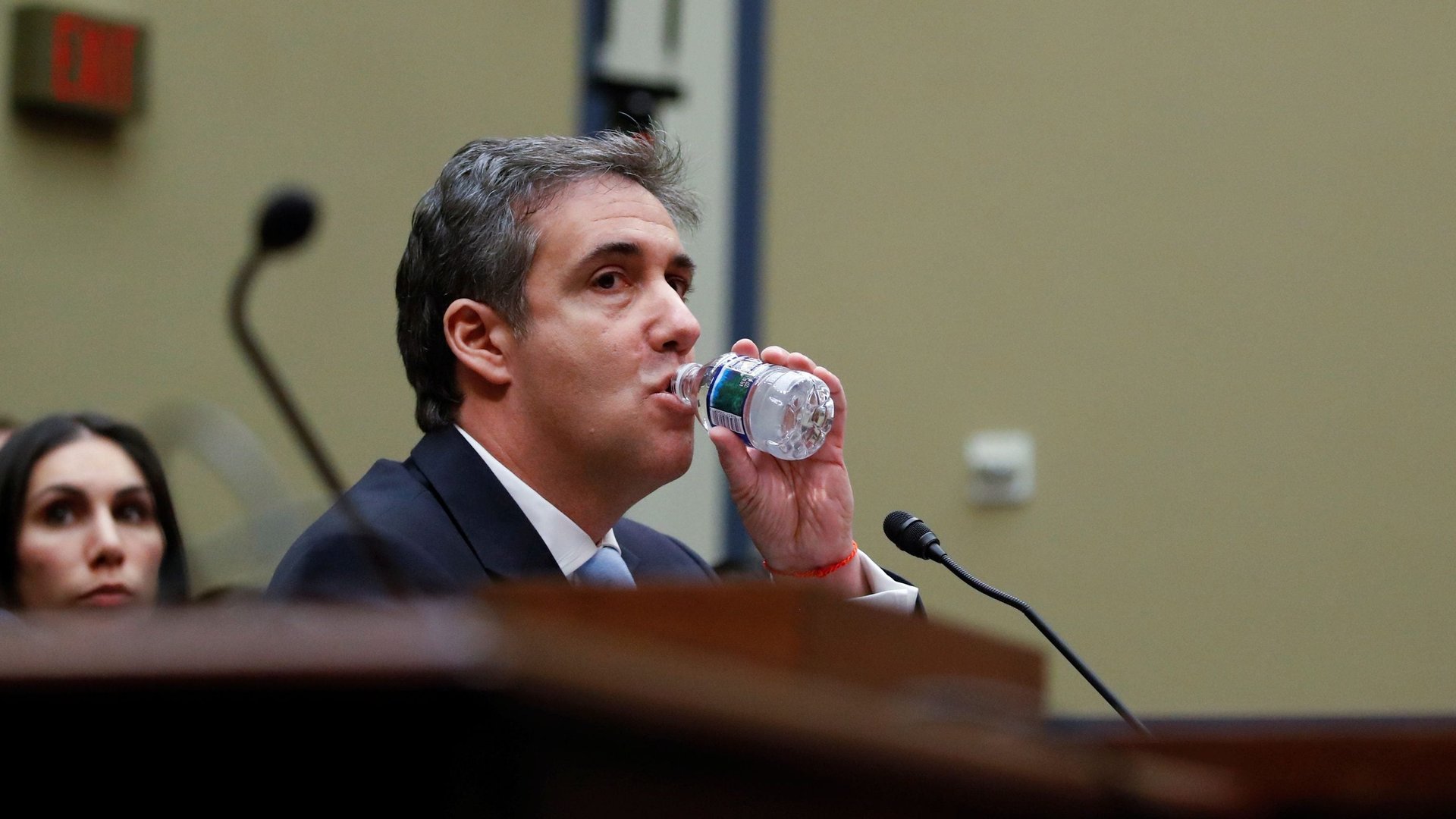Trump doubled his net worth in 2013 by adding $4 billion in “brand value”
Donald Trump claimed his personal net worth jumped from $4.6 billion in 2012 to $8.7 billion in 2013 by adding $4.1 billion in “brand value.”


Donald Trump claimed his personal net worth jumped from $4.6 billion in 2012 to $8.7 billion in 2013 by adding $4.1 billion in “brand value.”
That’s according to financial documents presented by former Trump attorney Michael Cohen in an open hearing today (Feb. 27) before the House Oversight and Reform Committee. It’s not completely implausible: Trump’s name and reputation do have value, and Trump has made most of his money over the years by licensing his name: Trump wines, Trump deodorant, and of course, Trump-branded buildings.
During questioning by Rep. Elijah Cummings, the committee chair and a democrat from Maryland, Cohen said he believed the numbers in Trump’s statements were “inflated,” and that the future president had provided the false figures to Deutsche Bank in an unsuccessful attempt to borrow money to buy the Buffalo Bills football team. Lying on a loan application is a federal crime that carries a maximum penalty of 30 years in prison.
“Donald Trump is a man who ran for office to make his brand great, not to make our country great,” Cohen said in his opening statement. “He had no desire or intention to lead this nation—only to market himself and to build his wealth and power. Mr. Trump would often say, this campaign was going to be the “greatest infomercial in political history.”
Cohen testified that Trump “wanted each year to have his net worth rise on the Forbes wealthiest individuals list.” (Trump once filed a $5 billion defamation lawsuit after a writer questioned his wealth in a 2005 biography.) To do that, Cohen said Trump routinely fudged the actual valuations of his properties “based upon what he wanted to value the asset at.”
“He basically was doing it because he’s insecure about not being a real billionaire,” says Brian DiMarco, a former brand media manager at Grey Advertising who later worked as an account executive at Anheuser-Busch. In Trump’s case, tacking on $4.1 billion in brand value due to his name seems like “a ballsy thing to do,” DiMarco tells Quartz, “but there’s precedent for it.”
Brand value is somewhat subjective, but there are still ways to quantify consumer perception.
According to marketing consultancy Interbrand, Coca-Cola’s brand value, for example, was estimated at just over $66 billion of the company’s total worth in 2018. By Interbrand’s calculations, Apple has a brand value of $214 billion, and Budweiser’s brand value comes to $16 billion.
But while name recognition makes brands like Budweiser, Apple, and Coca-Cola worth far more than simply tallying up all its real estate and equipment, the same can’t be said for an individual like Donald Trump. And whatever his brand was worth in 2013, it’s likely plunged since.
Various companies including at least one television network have severed their relationships with the president amid public outcry over Trump’s incendiary remarks and draconian policies, and an analysis of real estate sales data by the Associated Press found that prices fell in Trump condominium buildings in Manhattan over the past two years. Condo prices in Manhattan overall went up nearly 30% in that same period. Trump wines, which once sold at a 25% premium compared to similar bottles, now reportedly sell at a 20% discount. Crain’s New York Business reported that the Trump Organization’s revenues fell by more than 90% between 2010 and 2017.
Today, Trump claims a personal net worth of $3.1 billion. Whether or not that is true is impossible to tell, as Trump has stubbornly refused to release his tax returns, a practice that has been customary for all modern presidential candidates. If it’s a fib, it wouldn’t be his first. In the past, Trump has also tried to tell people that New York City’s Trump Tower was 68 stories tall (it’s actually 58), and that his now-defunct clothing line was in fact doing impossibly well.
“It’s ties, shirts, cufflinks, everything sold at Macy’s,” Trump told David Letterman in 2012. “And they’re doing great. Number-one-selling tie anywhere in the world.”
As Michael Cohen testified this morning, “I knew early on in my work for Mr. Trump that he would direct me to lie to further his business interests. I am ashamed to say, that when it was for a real estate mogul in the private sector, I considered it trivial. As the President, I consider it significant and dangerous.”